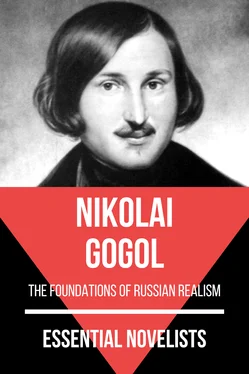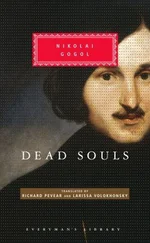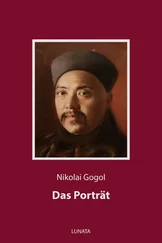Such were the flattering opinions earned by the newcomer to the town; and these opinions he retained until the time when a certain speciality of his, a certain scheme of his (the reader will learn presently what it was), plunged the majority of the townsfolk into a sea of perplexity.
––––––––

––––––––

FOR MORE THAN TWO WEEKS the visitor lived amid a round of evening parties and dinners; wherefore he spent (as the saying goes) a very pleasant time. Finally he decided to extend his visits beyond the urban boundaries by going and calling upon landowners Manilov and Sobakevitch, seeing that he had promised on his honour to do so. Yet what really incited him to this may have been a more essential cause, a matter of greater gravity, a purpose which stood nearer to his heart, than the motive which I have just given; and of that purpose the reader will learn if only he will have the patience to read this prefatory narrative (which, lengthy though it be, may yet develop and expand in proportion as we approach the denouement with which the present work is destined to be crowned).
One evening, therefore, Selifan the coachman received orders to have the horses harnessed in good time next morning; while Petrushka received orders to remain behind, for the purpose of looking after the portmanteau and the room. In passing, the reader may care to become more fully acquainted with the two serving-men of whom I have spoken. Naturally, they were not persons of much note, but merely what folk call characters of secondary, or even of tertiary, importance. Yet, despite the fact that the springs and the thread of this romance will not DEPEND upon them, but only touch upon them, and occasionally include them, the author has a passion for circumstantiality, and, like the average Russian, such a desire for accuracy as even a German could not rival. To what the reader already knows concerning the personages in hand it is therefore necessary to add that Petrushka usually wore a cast-off brown jacket of a size too large for him, as also that he had (according to the custom of individuals of his calling) a pair of thick lips and a very prominent nose. In temperament he was taciturn rather than loquacious, and he cherished a yearning for self-education. That is to say, he loved to read books, even though their contents came alike to him whether they were books of heroic adventure or mere grammars or liturgical compendia. As I say, he perused every book with an equal amount of attention, and, had he been offered a work on chemistry, would have accepted that also. Not the words which he read, but the mere solace derived from the act of reading, was what especially pleased his mind; even though at any moment there might launch itself from the page some devil-sent word whereof he could make neither head nor tail. For the most part, his task of reading was performed in a recumbent position in the anteroom; which circumstance ended by causing his mattress to become as ragged and as thin as a wafer. In addition to his love of poring over books, he could boast of two habits which constituted two other essential features of his character—namely, a habit of retiring to rest in his clothes (that is to say, in the brown jacket above-mentioned) and a habit of everywhere bearing with him his own peculiar atmosphere, his own peculiar smell—a smell which filled any lodging with such subtlety that he needed but to make up his bed anywhere, even in a room hitherto untenanted, and to drag thither his greatcoat and other impedimenta, for that room at once to assume an air of having been lived in during the past ten years. Nevertheless, though a fastidious, and even an irritable, man, Chichikov would merely frown when his nose caught this smell amid the freshness of the morning, and exclaim with a toss of his head: “The devil only knows what is up with you! Surely you sweat a good deal, do you not? The best thing you can do is to go and take a bath.” To this Petrushka would make no reply, but, approaching, brush in hand, the spot where his master’s coat would be pendent, or starting to arrange one and another article in order, would strive to seem wholly immersed in his work. Yet of what was he thinking as he remained thus silent? Perhaps he was saying to himself: “My master is a good fellow, but for him to keep on saying the same thing forty times over is a little wearisome.” Only God knows and sees all things; wherefore for a mere human being to know what is in the mind of a servant while his master is scolding him is wholly impossible. However, no more need be said about Petrushka. On the other hand, Coachman Selifan—
But here let me remark that I do not like engaging the reader’s attention in connection with persons of a lower class than himself; for experience has taught me that we do not willingly familiarise ourselves with the lower orders—that it is the custom of the average Russian to yearn exclusively for information concerning persons on the higher rungs of the social ladder. In fact, even a bowing acquaintance with a prince or a lord counts, in his eyes, for more than do the most intimate of relations with ordinary folk. For the same reason the author feels apprehensive on his hero’s account, seeing that he has made that hero a mere Collegiate Councillor—a mere person with whom Aulic Councillors might consort, but upon whom persons of the grade of full General [8]would probably bestow one of those glances proper to a man who is cringing at their august feet. Worse still, such persons of the grade of General are likely to treat Chichikov with studied negligence—and to an author studied negligence spells death.
However, in spite of the distressfulness of the foregoing possibilities, it is time that I returned to my hero. After issuing, overnight, the necessary orders, he awoke early, washed himself, rubbed himself from head to foot with a wet sponge (a performance executed only on Sundays—and the day in question happened to be a Sunday), shaved his face with such care that his cheeks issued of absolutely satin-like smoothness and polish, donned first his bilberry-coloured, spotted frockcoat, and then his bearskin overcoat, descended the staircase (attended, throughout, by the waiter) and entered his britchka. With a loud rattle the vehicle left the inn-yard, and issued into the street. A passing priest doffed his cap, and a few urchins in grimy shirts shouted, “Gentleman, please give a poor orphan a trifle!” Presently the driver noticed that a sturdy young rascal was on the point of climbing onto the splashboard; wherefore he cracked his whip and the britchka leapt forward with increased speed over the cobblestones. At last, with a feeling of relief, the travellers caught sight of macadam ahead, which promised an end both to the cobblestones and to sundry other annoyances. And, sure enough, after his head had been bumped a few more times against the boot of the conveyance, Chichikov found himself bowling over softer ground. On the town receding into the distance, the sides of the road began to be varied with the usual hillocks, fir trees, clumps of young pine, trees with old, scarred trunks, bushes of wild juniper, and so forth. Presently there came into view also strings of country villas which, with their carved supports and grey roofs (the latter looking like pendent, embroidered tablecloths), resembled, rather, bundles of old faggots. Likewise the customary peasants, dressed in sheepskin jackets, could be seen yawning on benches before their huts, while their womenfolk, fat of feature and swathed of bosom, gazed out of upper windows, and the windows below displayed, here a peering calf, and there the unsightly jaws of a pig. In short, the view was one of the familiar type. After passing the fifteenth verst-stone Chichikov suddenly recollected that, according to Manilov, fifteen versts was the exact distance between his country house and the town; but the sixteenth verst stone flew by, and the said country house was still nowhere to be seen. In fact, but for the circumstance that the travellers happened to encounter a couple of peasants, they would have come on their errand in vain. To a query as to whether the country house known as Zamanilovka was anywhere in the neighbourhood the peasants replied by doffing their caps; after which one of them who seemed to boast of a little more intelligence than his companion, and who wore a wedge-shaped beard, made answer:
Читать дальше













